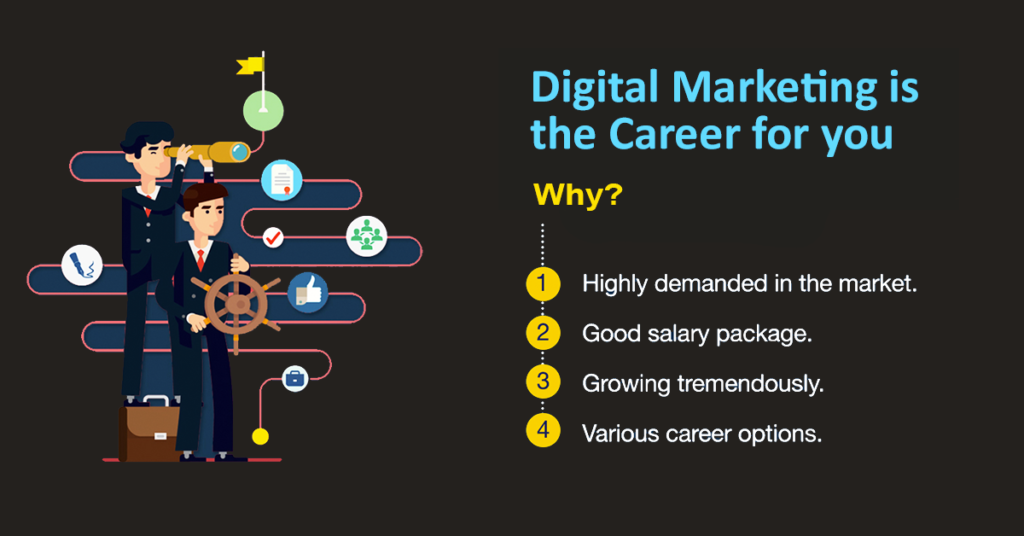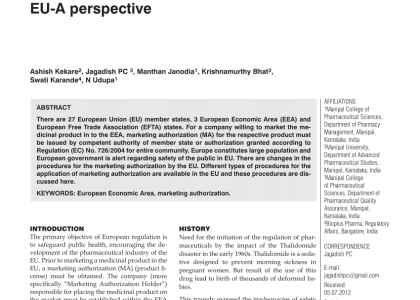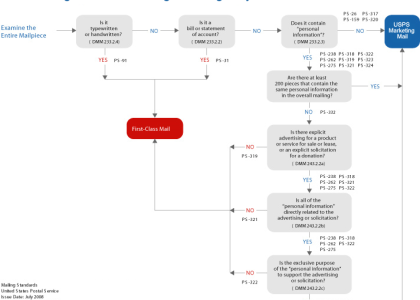Choosing a career is one of the most important decisions that people make in their lives. The right career can bring a sense of satisfaction and accomplishment, while the wrong one can lead to frustration and regret. In recent years, the field of marketing has emerged as a popular choice, attracting fresh graduates and experienced professionals alike. This article aims to shed light on why carving your professional path in the sphere of promotion can turn out to be a rewarding option.
Marketing remains an evergreen industry, with a myriad of opportunities open to those who choose to step into this domain. Whether you’re a creative mind seeking an outlet or an analytics enthusiast looking to solve complex challenges, marketing has a role for everyone. It’s a profession that offers diversity in its truest sense – diversified roles, varied industries, and contrasting working styles.
Not to forget, the field of marketing doesn’t just promise exciting opportunities, but also ensures significant financial gains. From junior positions to top-tier roles, the remuneration in this profession is known to be highly competitive. Furthermore, this industry is set to witness continuous growth and offers a steady career progression, making the decision to pursue a career in marketing even more compelling.
Lastly, marketing stands as a realm which truly keeps up with the times. With the digital era reshaping business landscapes, marketers are at the forefront of innovation, tasked with harnessing the power of technology to drive business growth.
Let’s dive deep into the world of marketing and explore why it remains a smart career choice and how it can lead to a fulfilling professional life.
Ubiquity of Marketing Expertise Across Diverse Sectors
Regardless of the industry, one thing remains constant – the need for effective marketing. This indispensable skill serves as the key mechanism that bridges the gap between a company’s products or services and its potential customers. Whether you’re in healthcare, fashion, tech or food, the demand for seasoned marketers with a solid grasp of the changing marketing landscape is not only apparent, but also continually on the rise.
Digital Marketing: A New Paradigm
With the advent of the digital age, the role of marketing has significantly evolved. This shift has brought about a whole new set of tools and strategies for marketers to master. The digital wave has also affected almost every industry, necessitating the incorporation and utilisation of digital marketing skills in order for businesses to stay relevant and competitive.
For example, marketers in the tech sector are often tasked with the arduous task of translating complex tech jargon into digestible information to attract a wider demographic of consumers. On the other hand, those in the fashion industry use innovative social media marketing strategies to showcase their latest collections and collaborations to a global audience.
The All-Round Benefits of Pursuing a Marketing Career
Apart from versatility, a career in marketing offers a plethora of benefits such as unravelling one’s creativity, understanding consumer psychology, and predicting market trends. It offers opportunities for growth and provides a space for continuous learning and adaptation. Furthermore, the skills acquired in marketing – such as communication, strategic thinking and creativity – are transferable and can be applied to many other areas of business.
- Unleashing Creativity: Marketing encourages professionals to constantly innovate and find new ways to communicate a brand’s message.
- Understanding Consumer Behavior: A deep dive into marketing aids in comprehending how customers think, behave and make buying decisions.
- Predicting Market Trends: Adept marketers are often skilled at analyzing market trends and predicting their evolution, helping companies stay ahead of the competition.
Moving forward, the demand for proficient marketing professionals is projected to grow. As businesses continue to acknowledge the importance of strategic marketing in various industries, the future promises rewarding opportunities for those who choose this career path.
A Diverse Spectrum of Opportunities in the Marketing Field
One of the major draws for individuals pursuing a career in marketing is the vast spectrum of opportunities it offers. With an extensive assortment of roles and niches available, there’s a well-suited marketing job for almost every preference and talent.
As a professional in this field, you will find a multitude of functions with varied responsibilities, ranging from data analytics and market research to customer engagement and brand management. This diversity of work can equip you with a much broader set of skills and insights than in many other fields.
Exploring the Various Roles in Marketing
- Data Analyst: As a data analyst, your role will revolve around understanding market trends, customer behavior, and the success of marketing campaigns through the analysis of data.
- Market Researcher: Market researchers generate vital information about customers’ and competitors’ behavior, which is then used to make strategic business decisions.
- Brand Manager: As a brand manager, you are in charge of managing the image and perception of a brand, ensuring consistency across all platforms and aligning all initiatives with the brand’s overall objectives.
- Social Media Manager: A social media manager’s role focuses on shaping and enhancing a business’s presence on various social media platforms, which includes content creation, social engagement, and performance tracking.
These roles, while different in numerous ways, are all constituent elements of marketing; working in any one of them can provide sufficiently different experiences and challenges. And it is this diversity – the opportunity to wear many different hats and continuously learn and grow – that makes the marketing profession particularly appealing to many.
It’s important to remember, though, that the diversity of roles in marketing also necessitates a global understanding of business operations, along with an ability to adapt and constantly acquire new skills and knowledge. This makes a career in marketing not only rewarding but also intellectually fulfilling.
The positive impact of creativity in the field of marketing
Being successful in marketing usually requires a great deal of creativity. It is one of the crucial factors that sets apart competitive and effective marketing from the others. In other words, creativity plays an essential role in invigorating the marketing field, making it richer and more rewarding for its professionals.
One of the significant benefits of creativity in marketing is stand out in the competitive marketplace. With an abundance of products and services available, customers often find it hard to choose from all the similar options. A creative marketer can find unique ways to showcase their product or service, differentiating it from similar offers and catching the customer’s attention.
Creativity drives effective problem-solving
Another advantage of requiring creativity in marketing is that it encourages out-of-the-box thinking. Such approach promotes effective problem-solving by addressing challenges from different perspectives. This approach enables a business to address its marketing issues by figuring out unconventional strategies and solutions that stand out while meeting the customer’s needs and expectations.
Moreover, creativity aids in effective storytelling. Customers no longer just look for a product or service; they are interested in the stories and experiences associated with it. A creative marketer can weave a compelling story around their product, greatly increasing its appeal to potential customers.
-
- Increased Customer Engagement:
The use of original and creative content can entice consumers, encouraging them to engage more with the brand. Interactive and engaging advertisements also create long-lasting impressions compared to traditional advertisements.
-
- Cost-Efficiency:
Creative campaigns need not be expensive. A simple, yet ingenious idea can have a significant impact without investing a large budget.
-
- Bolster Brand Image:
Original and creative marketing not only helps a company establish its uniqueness, but it also helps build a strong identity that customers can connect and relate with.
Overall, the creative approach in marketing can ultimately result in increased sales, greater customer loyalty, and not to forget – a rewarding career for the marketers!
The Influence of Technology on the Significance of Marketing
Emerging technologies are playing a pivotal role in increasing the need for marketing. They have not only transformed the way businesses operate but also how they reach out to their potential customers. With digital platforms opening up new avenues, marketing has become an essential tool for businesses to establish their brand identity and customer engagement.
Personalisation and Engaging Content
Digital platforms leverage big data to provide a hyper-personalised experience to users, and this is where marketing comes into the picture. Marketers using these platforms can create highly targeted campaigns that resonate with the preferences of their consumers. The real-time insights gathered help to design engaging content, nurturing consumers from the awareness stage to the consideration, and finally, the decision stage.
Increased Reach and Engagement
Technology has also broken geographical barriers, enabling businesses to extend their reach to international markets. Social media platforms are powerful marketing tools that increase visibility, engagement, and conversions. Brands can instantly connect and converse with their global audience on these platforms, helping build strong relationships and loyalty.
- Online Surveys and Polls: They are excellent tools for understanding customer preferences and enhancing product offerings.
- Video Marketing: Technology has made video content more accessible. A well-crafted video can tell a brand’s story effectively, driving customer emotion and action.
- Chatbots: They provide instant customer service, pushing prospects further down the sales funnel.
Therefore, the convergence of marketing and technology has created new opportunities and challenges for businesses. Navigating this digital landscape successfully can result in a competitive advantage, enhancing brand positioning in a marketplace overflowing with options. Hence, a career in marketing can indeed be a rewarding choice in this digital age.
A Look at the Top Earnings in the Marketing Profession
Choosing a career in marketing can be a financially wise decision due to the lucrative salaries associated with various roles within the industry. The potential to earn a high salary is significantly enhanced by the broad range of professional paths available in marketing, each with its unique remuneration level.
For instance, marketing managers are highly rewarded financially for their role in coordinating marketing policies and programs, with earnings well into the six-figure range. On average, they earn a median wage of about $135,900 annually, according to the U.S. Bureau of Labor Statistics. At the top end of the wage scale, the best-paid marketing managers can receive an annual salary exceeding $208,000. The strategic decision-making and significant responsibilities within their role command such high pay.
Market research analysts also enjoy considerable salaries due to the invaluable role they play in helping organizations understand their markets, customers, competitors, and other market dynamics. In the United States, these professionals earn a median annual salary of approximately $63,120. However, the top 10 percent of market research analysts can make over $122,630 annually.
Moreover, digital marketing has brought about a new set of specialized roles with lucrative salaries, such as Search Engine Optimization Specialists or Social Media Managers. These roles require professionals with specific sets of skills, which are highly sought after in today’s digital age.
- SEO Specialists help push websites to the top of search engine results and can attract a median salary of about $53,465 per year. However, the top quartile of SEO Specialists can earn upwards of $79,149 per year.
- Social Media Managers play a pivotal role in managing and growing an organization’s online presence. An average social media manager in the United States earns about $50,391 annually, but those in the top 10% can rake in over $79,000 annually.
In conclusion, a career in marketing can provide substantial financial rewards, given the wide spectrum of roles with diverse salary potentials. It is one of the career fields where one can enhance their earning potential with experience, expertise, and upward progression in their profession.
Exploring the Pathways for Advancing in the Marketing Sector
With its constant evolution and innovation, pursuing a profession in the dynamic field of marketing offers numerous pathways for career advancement. The digital revolution has created a plethora of new job roles and opportunities for motivated marketers looking to rise through the ranks.
Beginning at an Entry-Level Position
Starting in an entry-level role such as a Marketing Assistant or a Junior Analyst provides an ideal stepping stone to launch your career in marketing. With dedication and drive, these positions can be springboards into more senior roles. Responsibilities often include administrative tasks, gathering market research, and supporting marketing campaigns.
Climbing the Marketing Ladder
After gaining experience in entry-level marketing roles, the next step is often a mid-level management position. These roles, such as Marketing Manager or Product Manager, carry more responsibility. They involve overseeing campaigns, managing staff and coordinating with other business areas. Your influence on strategic decisions increases at this level, marking the first real steps towards leadership.
Branching into Specialized Areas: Digital Marketing & SEO
The advent of digital marketing has opened up new avenues for career progression in marketing. Becoming a Digital Marketing Specialist or a Search Engine Optimization (SEO) Manager is now a sought-after career path. These roles involve developing and implementing online marketing strategies, creating content to drive internet traffic and optimizing website visibility.
- Digital Marketing Specialist: This role involves planning and executing digital campaigns, measuring their success, and managing social media platforms.
- SEO Manager: This role focuses on optimizing a company’s online content to achieve higher search engine rankings, and drives organic traffic to the company’s website.
With many roles and specializations available, the marketing sector uniquely rewards diverse skills and interests. Whether you’re drawn to data, have a flair for creativity, or possess strong leadership qualities, there’s a marketing career path that can accommodate and nurture these talents.
The Importance of Effective Communication in Ensuring Marketing Success
One of the key elements in the world of marketing from which significant benefits may be reaped is effective communication. This serves as a fundamental bridge between businesses and their target audiences, making it a vital and indispensable tool for success.
Communicating the right message in a clear and compelling manner is at the very essence of marketing. By doing so, companies can influence and trigger desired responses from their potential customers. In fact, the ability to expertly craft and deliver such messages can be the difference between the realization of business goals and just finding oneself merely aspiring for them.
The Art of Conveying Pertinent Information
Excellent communication means knowing what to say, how to say it, and when to say it. This requires a deep understanding of the target market. Knowing their preferences, views, and what resonates with them can greatly influence the way messages are shaped and conveyed. Additionally, it is important to consider the right communication channels to ensure that information accurately reaches its intended recipients.
Effective communication also plays a critical role in building customer relationships. Successful marketers are those who do not only share information about their product or service, but can also create meaningful connections with consumers. This is achieved through understanding their needs, responding to their feedback, and showing that they matter to the business. This helps foster loyalty and can lead to repeated patronage, making it an invaluable component of a rewarding marketing career.
- Conveying a Clear Message: A message that is easily understood leaves no room for confusion and ensures that the audience’s attention remains focused.
- Building Customer Relationships: Great communication opens up a two-way avenue which enables businesses to establish a strong rapport with their customers.
- Using the Right Channels: Choosing the appropriate communication channels ensures that the message reaches the maximum number of target audience.
Indeed, success in the marketing field largely depends on the ability to communicate effectively. By mastering this skill, you can certainly make a fulfilling career in marketing, given its pivotal role in achieving the desired business outcomes.
A Harmonious Blend of Analytic and Creative Acumen: A Hallmark of Successful Marketing Professionals
In the dynamic sphere of marketing, professionals often find themselves engaged in striking a delicate balance between analytical insights and inventive thinking. The dual nature of marketing roles can provide countless rewarding opportunities but also present unique challenges.
On one hand, analytical skills are deemed critical in today’s data-driven marketing landscape. Empowered with these skills, marketers can scrutinize industry trends, forecast market demand, analyze consumer behavior, assess the effectiveness of marketing strategies, and make informed business decisions. Big Data, machine learning, and other advanced technologies have further accentuated the importance of analytical abilities in the realm of marketing.
However, dabbling in numbers and algorithms alone does not constitute the entirety of marketing roles. Creativity aptly complements analytical proficiency in the marketing profession. It is vital in piquing the interest of potential customers, crafting compelling stories around products or services, and implementing innovative strategies that set a company apart in the crowded market space. Stellar marketing initiatives often spring from out-of-the-box thinking and artistic flair.
- Brand Strategy Development: This involves creating unique identities for products and services, and positioning them effectively in the marketplace. Both creativity and analytical skills are essential in understanding consumer perceptions and crafting unique brand narratives.
- Social Media Management: Embracing the analytics helps in understanding the performance of posts, engaging content, optimal posting time, and the success of social media campaigns. Meanwhile, creativity assists in generating engaging content and forming genuine connections with the audience.
- SEO and Content Marketing: Analyses aid in determining the keywords that will maximize reach and engagement, while creativity helps in crafting compelling contents that resonate with target consumers.
In conclusion, while the assortment of roles within marketing may favor one skill over the other, the most successful practitioners understand that both are essential, and neither can be completely forsaken. This fusion of analysis and creativity is, perhaps, one of the many elements that makes a career in marketing such a rewarding choice.
The Power and Impact of Marketing: Steering Consumer Purchase Decisions
The ever-evolving field of marketing holds immense capability in determining the purchasing habits of consumers. Every daily interaction, from the billboard you see on your morning commute to the sponsored post in your social media feed, has been meticulously laid out by marketers aiming to shape your buying behavior. Crafting strategies to persuade potential customers, marketers profoundly affect the direction and magnitude of consumer spending.
Marketing professionals utilize consumer behavior understanding and a slew of analytical tools to develop compelling campaigns. They manipulate consumers to associate positive emotions and values with their products, and this emotional connection largely drives the decision-making process relating to purchases.
The Tools of Persuasion
Marketers deploy an arsenal of tactics to mold consumer tastes. These tactics broadly fall under the following categories:
- Advertising: Traditional ads on TV, radio, print, and digital platforms remain as effective tactics. They are vital in introducing products, creating brands’ identities, and maintaining a positive public image. Digital advertising, true to its personalized nature, attempts to create a one-on-one conversation with the consumer.
- Pricing Strategy: Marketers use differential pricing schemes to appeal to various segments of a market. This strategy includes discounts, bundling, and premium pricing, leading to the perceived value of a product and hence influencing the buying decision.
- Social Proof: The use of testimonials, customer reviews, and endorsements are successful tools in convincing potential customers. As consumers rely on the experiences of others, these measures add credibility and trust to the product or service.
- Content Marketing: This approach focuses on providing consumers with valuable and engaging content to build lasting relationships and loyalty. It subtly promotes a product or service while ensuring a positive interaction between the brand and the consumer.
At its core, marketing’s mission is to simplify and guide the buyer’s journey. Harnessing the power of psychology, creativity, and data, marketing professionals significantly drive market trends and consumer choices. A career in this vibrant and influential field is not only rewarding but is also at the forefront of shaping today’s consumer-centric world.
Thrill of Staying Ahead with Current Market Movements
Navigating and understanding the dynamics of current trends can be exhilarating. There are few career fields, such as marketing, where the ability to keep your finger on the pulse of society’s shifting preferences and behaviours is so rewarding.
Marketing professionals are in the unique position of not just witnessing these movements, but actively participating in shaping them. This aspect of the job fuels a level of enthusiasm that is contagious and can permeate entire teams and organizations.
The Gratification of Recognizing Trends
One of the greatest thrills in a marketing career is successfully identifying a burgeoning trend before it hits mainstream. The sense of self-satisfaction and accomplishment when your foresight proves accurate is hard to beat. Moreover, decoding and predicting trends can positively impact a company’s performance, further motivating marketing professionals to stay ahead in their field.
Engaging with Trends: A Growth Catalyst
Yet,it is not enough just to identify trends. Marketing pros are tasked to find innovative ways to engage with these trends. This often involves brainstorming and implementing creative campaigns to ride the wave. It requires a blend of strategic thinking, creativity, and a deep understanding of the audience’s wants and needs – a combination that keeps the work invigorating and stimulating.
- Diving deep into audience analysis to ascertain their evolving preferences.
- Strategizing and creating compelling and innovative campaigns around these insights.
- Tracking the success of these campaigns and tweaking them as per the results and response.
Finally, it’s this constant sense of evolution and progression and the capacity to influence and engage directly with society that make a career in marketing an exciting, fulfilling choice.
Experiencing the Joy of Teamwork in Marketing Jobs
Working in a marketing profession offers a unique and fulfilling facet – the opportunity to work in team settings. This collaborative work environment enables individuals to benefit from diverse skillsets and perspectives, fostering creativity, innovation, and problem-solving capacities.
Embracing a collaborative approach, where there is a pooling of knowledge and skills, reinforces learning and growth in marketing professionals. There’s a saying, “If you want to go fast, go alone. If you want to go far, go together.” This quote embodies the spirit of teamwork in marketing roles.
- Innovation is a product of collective brainstorming. Through team interactions, marketers unearth ground-breaking ideas, making them critical components of their organization’s success.
- Team settings in marketing roles offer incredible learning opportunities. By working with diverse individuals, professionals get to learn about different marketing strategies and increase their own knowledge and abilities.
- A team environment often promotes healthy competition, encouraging individuals to strive for excellence in their work. As each team member pushes the other, they collectively help shape a successful marketing project.
However, teamwork does not come easy. It requires a culture of mutual respect, good communication, and patience within the team. Leaders play a pivotal role in fostering such values among their members. When success is achieved collectively, it instills a sense of belonging, paving the way for a rewarding career in marketing.
In conclusion, the importance of teamwork in marketing careers cannot be overstated. It’s the engine that powers innovation and personal development, leading to professional satisfaction and accomplishment. Therefore, choosing a career in marketing provides an individual the rewarding experience of working in team settings, paving the way for both personal and professional growth.
Job Stability: A Glimpse Into the Ever-Increasing Need for Professionals in the Marketing Industry
Irreplaceable Value of the Marketing Professionals
There is a robust demand for marketers across different industries. They play a significant role in steering a company’s growth and maintaining its competitive edge. This is because the digital era has created a necessity for businesses to constantly update their strategies and processes in order to stay relevant to their target audience. Following this, marketers are one of the professionals who are always sought after by businesses due to their ability to drive growth, with skills in digital marketing, data analytics, SEO, social media, and content marketing.
Additionally, the ability to understand consumer behavior, preferences, and new emerging trends are key competencies required in the market. A new breed of marketers who can blend creativity with analytics is much needed to leverage the power of personalized marketing. This reaffirms the fact that these professionals are in high demand across the job market.
Dynamic Market Conditions and the Role of Marketers
The world of business is susceptible to constant changes. Technological advancements, evolving customer preferences, and shifts in market trends are just a few of the reasons why the marketing landscape is dynamic and ever-changing. These changes create many opportunities for marketers to showcase their problem-solving skills and innovative thinking. Organizations need their expertise to develop strategies that meet customers’ changing needs. As such, businesses are constantly on the lookout for marketers, which provides great job security in this field.
Driving Business Success through Improved Marketing Strategies
Marketing professionals serve as the bridge between companies and customers. This means that they play a key role in defining a company’s value proposition, building brand awareness, and driving customer engagement. By using data-driven insights and innovative marketing strategies, they not only help businesses to adapt to the ever-changing business environment but also to stand out among competitors. These vital responsibilities make these professionals indispensable, hence leading to high demand and great job stability.
Opportunities for Continuous Learning and Development
Marketing is a field that provides countless opportunities for continuous learning and professional development. Through hands-on experience, training, seminars, certifications, marketers continuously improve their knowledge, skills, and competencies. This not only ensures their relevance in the job market but also makes them highly sought-after.
To sum up, the need for professionals who can drive business growth and navigate the digital landscape is always on the rise. The digital evolution, coupled with the necessity for businesses to stay ahead of the curve has made marketing professionals an invaluable asset to any organization.
FAQ: Why marketing is a good career
Why are marketers always in demand?
Marketers are always in demand because businesses need professionals who can help them sell their products or services, establish a strong brand, and gain a competitive advantage in their industry. Marketing is critical to any business’s success and thus, marketers are always necessary.
What makes marketing a secure job?
Marketing is considered a secure job as it is present in every industry, institutions and companies. As long as companies need to promote their products or services, there will be a need for skilled marketers. Furthermore, with the rise of digital marketing, a whole new sphere of opportunities have opened for marketers.
Is the demand for marketers increasing?
Yes, the demand for marketers, particularly digital marketers, is on the rise because of the increasing importance of online platforms in promoting products and building brand awareness. With the growing reliance on digital channels, businesses are in need of professionals who can navigate and leverage these platforms effectively.
What skills are in demand for marketers?
Some of the most in-demand skills for marketers are digital marketing, analytics, content creation, SEO optimization, social media marketing, and customer relationship management. Additionally, creativity, adaptability, and strategic thinking are highly valued soft skills in the marketing industry.
How has the marketing job sector changed over the years?
The advent of digital marketing has significantly changed the job sector. Traditional marketing roles are evolving into hybrid roles that require digital skills. The scope of marketing has also broadened to include areas like content marketing, social media, and data analysis. With the ever-changing digital landscape, marketers need to continuously upskill to stay relevant.
Is specialization important in marketing?
Yes, while having a broad marketing skill set is beneficial, specialization in particular areas of marketing such as SEO, content marketing, etc., could increase job opportunities and potentially guarantee job security in the highly competitive market.
Can a career in marketing be recession-proof?
While no job is completely recession-proof, marketing jobs tend to be more secure because even during tough economic times, companies need marketers to help promote their products or services and maintain their customer base. Therefore, the demand for marketers can remain relatively steady even in a downturn.










